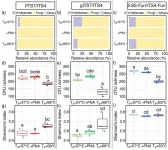(Press-News.org) As Canada’s flu season collides with record strep A cases and ongoing COVID-19 concerns, a new study is shedding light on our understanding of respiratory immune responses. Scholars from the Research Institute of the McGill University Health Centre (RI-MUHC) have discovered a surprising facet about a century-old vaccine for tuberculosis, Bacillus Calmette Guérin (BCG). The study, published in the journal Nature Immunology, uncovered a previously unknown mechanism that extends the vaccine’s shield to combat influenza A virus—the most prevalent flu strain.
“The immune interactions involved here can ‘train’ the lungs, which are frequently exposed to infectious agents in the environment. If we can map out the protective immune pathways involved in the lungs, this will revolutionize our conceptual and clinical approaches in developing vaccines against infections, including emergent respiratory viruses,” explains lead author Maziar Divangahi, a pulmonary immunologist, a senior scientist at the RI-MUHC, and a Professor of Medicine at McGill University. The discovery paves the way for future studies to assess whether BCG could be used to prevent other emergent viruses. Notably, research on the vaccine’s protection against COVID-19 has had promising results.
About the study
“BCG immunization induces CX3CR1hi effector memory T cells to provide cross-protection via IFN-γ-mediated trained immunity” by Kim Tran et al. was published in Nature Immunology.
END
Fighting the flu: The surprising power of a century-old vaccine for tuberculosis
2024-02-26
ELSE PRESS RELEASES FROM THIS DATE:
The effects of primer pairs, PCR conditions, and peptide nucleic acid clamps on plant root fungal diversity assessment
2024-02-26
Fungi are frequently found both around and within plant tissues (especially in roots) and are involved in both plant nutrient acquisition and resistance to pathogens. Thus, characterizing the diversity and composition of plant-associated fungal communities has been a growing interest in recent years.
High-throughput sequencing (HTS), also called metabarcoding, has become a prominent tool to assess complex microbial communities from environmental samples. However, HTS applied to plant-associated ...
Can hunger be eradicated by 2030?
2024-02-26
World hunger is growing at an alarming rate, with prolonged conflicts, climate change, and COVID-19 exacerbating the problem. In 2022, the World Food Programme helped a record 158 million people. On this trajectory, the United Nations’ goal to eradicate hunger by 2030 appears increasingly unattainable. New research at McGill University shines the spotlight on a significant piece of the puzzle: international food assistance.
With no global treaty in place, food aid is guided by a patchwork of international agreements and institutions. Using the concept of a “regime ...
A novel method for easy and quick fabrication of biomimetic robots with life-like movement
2024-02-26
Ultraviolet-laser processing is a promising technique for developing intricate microstructures, enabling complex alignment of muscle cells, required for building life-like biohybrid actuators, as shown by Tokyo Tech researchers. Compared to traditional complex methods, this innovative technique enables easy and quick fabrication of microstructures with intricate patterns for achieving different muscle cell arrangements, paving the way for biohybrid actuators capable of complex, flexible movements.
Biomimetic robots, which mimic the movements and biological functions of living organisms, are a fascinating area of research that ...
Austria isolates and genotypes Leptospira bacteria for the first time
2024-02-26
[Vienna, Feb 26 2024] — Leptospirosis is a globally distributed infectious disease that affects both animals and humans. While the infection is endemic in tropical regions, its incidence seems to increase in temperate regions. The serological diagnostic test used in routine to detect antibodies against the bacteria responsible for the disease performs better when local variants are used. In Austria, however, no locally circulating strain has been available to date. A new study, published in the latest issue of Scientific Reports, has now been able to close this research gap.
"In our study, ...
Major new funding supports early career investigators working on cures for pancreatic cancer
2024-02-26
Bethesda, MD (Feb. 26, 2024) — The AGA Research Foundation has announced a $1.4 million endowment grant from The Bern Schwartz Family Foundation. The AGA Institute will provide matching support, resulting in a $2.8 million endowment dedicated to advancing basic research in pancreatic cancer, the third leading cause of cancer deaths in the U.S.
The endowment will fund a second AGA-Bern Schwartz Family Fund Research Scholar Award in Pancreatic Cancer. The first award, created in 2013, will also continue. Both awards provide selected early career-investigators with $100,000 per year for three years ...
Poison center calls for ‘magic mushrooms’ spiked after decriminalization, study finds
2024-02-26
Calls to U.S. poison centers involving psilocybin, or “magic mushrooms,” among adolescents and young adults rose sharply after several U.S. cities and states began decriminalizing the hallucinogen, University of Virginia School of Medicine researchers have found.
Psilocybin-related calls more than tripled among teens ages 13-19 from 152 to 464 and more than doubled among adults ages 20-25 from 125 to 294 between 2018 and 2022, according to anonymized data gathered from the National Poison Data System. Local and state efforts to decriminalize the possession, use and cultivation of psilocybin began in May 2019. Oregon and Colorado have decriminalized psilocybin, as ...
Researchers overestimate their own honesty
2024-02-26
The average researcher thinks they are better than their colleagues at following good research practice. They also think that their own research field is better than other research fields at following good research practice. This is shown in a new study by researchers at Linköping University, Sweden. The results point to a risk of becoming blind to one’s own shortcomings, according to the Linköping researchers.
“The starting point for the project is that there’s a bit of a crisis in the research world. Research misconduct or difficulties to replicate research results have been discovered in many studies. Credibility has been called into question,” ...
Tattoo inks don’t match the ingredients listed on the bottle
2024-02-26
When you get a tattoo, do you know what you’re putting under your skin? According to new Binghamton University research, the ingredient labels on tattoo ink don’t match the actual substances in the bottle.
Produced by the lab of Binghamton Univerity Assistant Professor of Chemistry John Swierk, “What’s in my ink: An analysis of commercial tattoo ink on the U.S. market” was recently published in the journal Analytical Chemistry.
Swierk’s lab explores the potential impact of light on tattoos and their chemical breakdown. Early on, doctoral student Kelli Moseman ...
May I have a quick word? Study shows talking faster is linked to better brain health as we age
2024-02-26
As we get older, we may start to notice it takes us longer to find the right words. This can lead to concerns about cognitive decline and dementia.
However, a new study by Baycrest and the University of Toronto suggests that talking speed is a more important indicator of brain health than difficulty finding words, which appears to be a normal part of aging. This is one of the first studies to look at both differences in natural speech and brain health among healthy adults.
“Our results indicate that changes in general talking speed may reflect changes in the brain,” says Dr. Jed Meltzer, ...
Vanishing forests and suffering children: The hidden toll of deforestation in Cambodia
2024-02-26
Deforestation, a critical consequence of human activity, has garnered significant attention due to its impact on environmental sustainability, biodiversity and climate change. However, an equally pressing yet less explored aspect is the relationship between deforestation and human health, especially in impoverished regions. Scientists have increasingly recognized the detrimental effects of deforestation on various aspects of human health, particularly among children. Studies reveal that children residing in areas with high deforestation rates are at an elevated risk of malaria, ...





